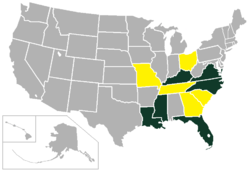- Metro Conference
-
Metro Conference Established 1975 Dissolved 1995 Association NCAA Division Division I Members 7 (final), 13 (total) Locations The Metropolitan Intercollegiate Athletic Conference, popularly known as the Metro Conference, was an NCAA Division I athletics conference, so named because all of its charter members were in urban metropolitan areas in, or at least on the fringes of, the Southern United States. The conference never sponsored football, although most of its members throughout its history had Division I-A football programs (from 1983-91, all Metro schools had independent football programs). In 1995 it merged with the Great Midwest Conference to form Conference USA. The merger was driven mainly by football, as several Metro Conference members had been successfully lured to larger conferences that sponsored the sport.
The conference was popularly known as the "Metro 6" during its first season, then as the "Metro 7" during the rest of the 1970s and early 1980s. For most of its existence, it was considered a "major" conference.
Contents
History
In 1978, Georgia Tech left the Metro for the Atlantic Coast Conference. In 1991, Florida State joined the ACC, and then South Carolina joined the Southeastern Conference. However, South Carolina rejoined the Metro for 1993 and 1994 men's soccer seasons in that sport only, because the SEC does not offer the sport for men (four schools are required to sponsor a sport; the SEC had just three, now two). Charter members Cincinnati and Memphis State also left the conference in 1991 to become charter members of the Great Midwest. To replace them, three of the stronger non-football schools from the Sun Belt Conference shifted to the Metro.
In 1993, the Metro and Great Midwest conferences began reunification talks that led to the creation of C-USA. However, the Virginia schools filed a lawsuit in order to prevent the merger from happening, which ultimately failed. VCU joined the Colonial Athletic Association. Virginia Tech (who were banking on an invitation to join the Big East Conference) were left out of Conference USA, and joined the Atlantic 10 Conference (they are now in the Atlantic Coast Conference). They were joined by Great Midwest member Dayton, who was intrigued by the prospect of playing against Xavier. South Carolina was not permitted to participate in the Conference USA for men's soccer, although they were admitted ten years later, also bringing along Kentucky, the only other soccer school in the SEC.
Proposed super conference
The Metro Conference also had studies into a new "Super conference" in 1990. The study was conducted by Raycom Sports. It would have consisted of teams as seen in the table below. At the time the Metro Conference was a non football conference though. The original study plan also included Pennsylvania State.[1]
North Division South Division Boston College East Carolina Cincinnati Florida State Pittsburgh Louisville Rutgers Memphis State Syracuse Miami Temple South Carolina Virginia Tech Southern Mississippi West Virginia Tulane Membership
Charter members
- Cincinnati (1975-91)**
- Georgia Tech (1975-78)
- Louisville (1975-95)**
- Memphis State (1975-91)*
- Was known as Memphis State University at the time. The name change did not take effect during this period.
- Saint Louis (1975-82)**
- Tulane (1975-95)*
- From 1985 through 1989, Tulane dropped its men's basketball program after a point shaving scandal but remained a member of the conference in all other sports.
Later Joined
- Florida State (1976-91)
- Virginia Tech (1979-95)
- Southern Miss (1982-95)*
- South Carolina (1983-91, 1993-94 men's soccer only) *MS
- The Southeastern Conference does not sanction men's soccer as only two schools offer the sport (four are required to sponsor a sport). When the Gamecock men's soccer program rejoined C-USA in 2005 after ten seasons as an independent, fellow SEC conference member Kentucky, the other school, left the Mid-American Conference to follow their SEC brethren.
Joined after Conference Split from the Sun Belt
- UNC Charlotte (1991-95)** (NF/2013)
- South Florida (1991-95)** (NF/1996)
- Virginia Commonwealth (1991-95)
NOTE: NF = Non-football school at the time but has since added football, first year of play listed. * School remains in the reunified Conference USA.
** School was charter member of Conference USA, but has since left for another conference.Membership time line

Championships
Notes
External links
Conference USA East Division West Division Soccer-only members Kentucky Wildcats (men's) • South Carolina Gamecocks (men's) • FIU Golden Panthers (men's) • Colorado College Tigers (women's)
Rowing-only members History Categories:- Defunct NCAA Division I conferences
- Conference USA
Wikimedia Foundation. 2010.


